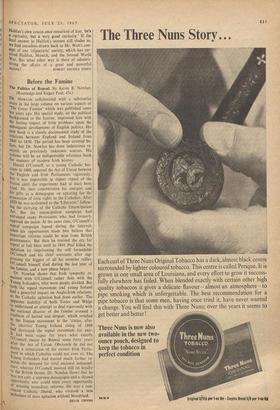Before the Famine
The Politics of Repeal. By Kevin B. Nowlan. (Routledge and Kegan Paul, 45s.)
DR. NOWLAN collaborated with a substantial essay in the large volume on various aspects of The Great Famine' which was published some ten years ago. His special study, on the political background to the famine, impressed him with the lasting impact of Irish problems upon the subsequent development of English politics. His new book is a closely documented study of the relations between England and Ireland from 1841 to 1850. The period has been covered be- fore, but Dr. Nowlan has done industrious re- search on previbusly unknown sources. His Volume will be an indispensable reference book for students of modern Irish history.
Daniel O'Connell, as a young Catholic bar- rister in 1800, opposed the Act of Union between but English and Irish Parliaments vigorously; out it was impossible tp expect repeal of the Union until the experiment had at least been tried. He then concentrated his energies and his gifts as a demagogue on agitating for the Concession of civic rights to the Catholics. After 1829 he was acclaimed as the 'Liberator,' follow- ing the carrying of the Catholic Emancipation Act. But the emancipation campaign had estranged many Protestants who had formerly °Primed the union. At the same time, O'Connell's repeal campaign lapsed during the intervals w hen his opportunism made him believe that important reforms could be won from British governments. But then he revived the cry for repeal at full blast until in 1841 Peel killed the agitation by imprisoning the still formidable (TConnell and his chief assistants after sup- Pressing the biggest of all his monster rallies. O'Connell himself died during the last year of the famine, and a new phase began. Dr. Nowlan shows that Irish sympathy re- mained with O'Connell rather than with the Young Irelanders, who were deeply divided. But both the repeal movement and young Ireland had a powerful impact on Anglo-Irish relations, as the Catholic agitation had done earlier. The apparent inability of both Tories and Whigs to understand or attempt to deal vigorously with the national disaster of the famine aroused a tradition of hatred and despair, which resulted
in the Fenian movement in the 'sixties, after the abortive Young Ireland rising of 1848 had destroyed the repeal movement for ever. It had been vague for years what exactly O'Connell meant by Repeal some forty years after the Act of Union. Obviously he did not desire a restoration of the extinct Irish Parlia- t_tr!ent in which Catholics could not even sit. The Young Irelanders had moved much farther to- Wards the demand for total national independ-
ence, whereas O'Connell insisted still on loyalty to the British throne. Dr. Nowlan shows that he Was not only a supreme demagogue and a shrewd opportunist who could seize every opportunity of winning immediate reforms. He was a con- /lifted Catholic liberal, who evolved a new technique of mass agitation withotit bloodshed.
DENIS GWYNN














































 Previous page
Previous page